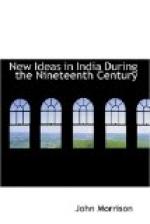[Sidenote: Three dynamical elements of Christianity.]
As proved by observation in India, the dynamical elements of Christianity may be briefly enumerated as follows. Monotheism, tending more and more to the distinctively Christian idea of God, Our Father, is commending itself, and being widely accepted. Secondly, in a remarkable degree, Jesus Christ Himself is being recognised and receiving general homage. In a less degree, and yet notably, the Christian conception of the Here and Hereafter is commending itself to the minds of the new-educated Hindus. In the new religious organisations also, the Christian manner of worship and of public worship commends itself almost as a matter of course. In none of these spheres am I describing the outcome of visible conflict or of any loud controversy. Rather, Christianity brought close to the religious instincts and the religious ideas of India has been like a great magnet introduced among a number of kindred but non-magnetised bodies lying loosely around. In the presence, simply, of these dynamical elements, or in contact with them, Indian religious thought is becoming polarised. Towards and away from the same great points, Indian religious thought is setting. These dynamical elements of Christianity, and the illustration of their power, will be considered in the following chapters.
Of the elements of Christianity that have proved themselves dynamical, we may note the natural order in which they have come. The order in which I have stated them is the order in which they asserted themselves, first “God Our Father,” then “Jesus Christ Himself.” First, of this world in which we find ourselves, when our minds awake, we must have some satisfying conception. The belief in one God, in Him for whom we can find no better name than “Our Father,” approved itself to awakened India, to the intellectually enlightened, and in the first place to small groups of enlightened men in the large towns, the centres of modern education and Christian influence. Then came an advance of a different nature altogether. To those spiritually minded and more intense men who




